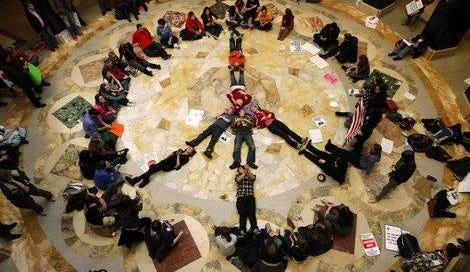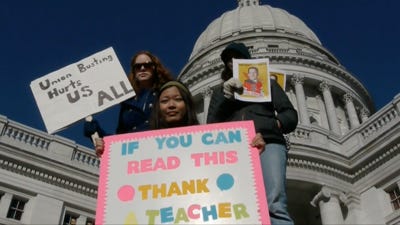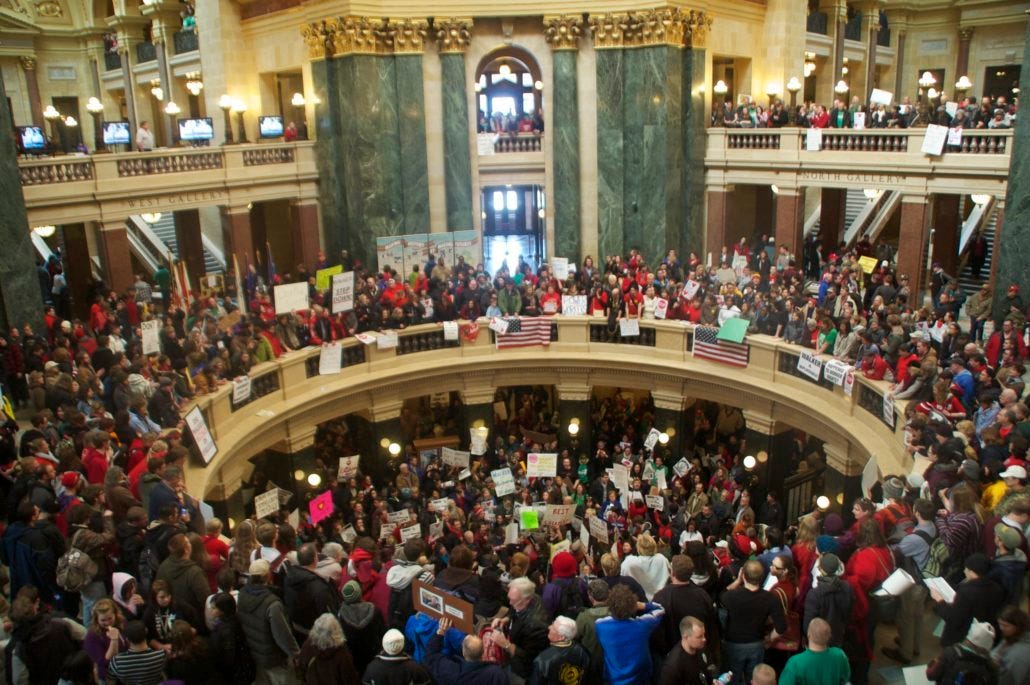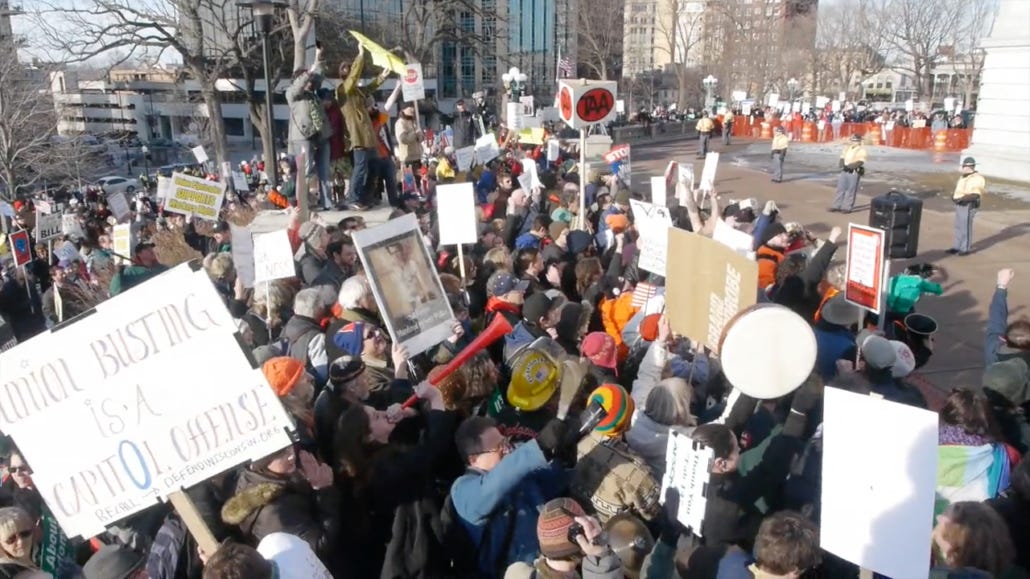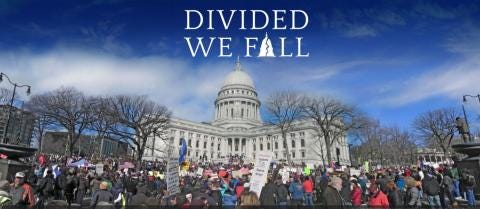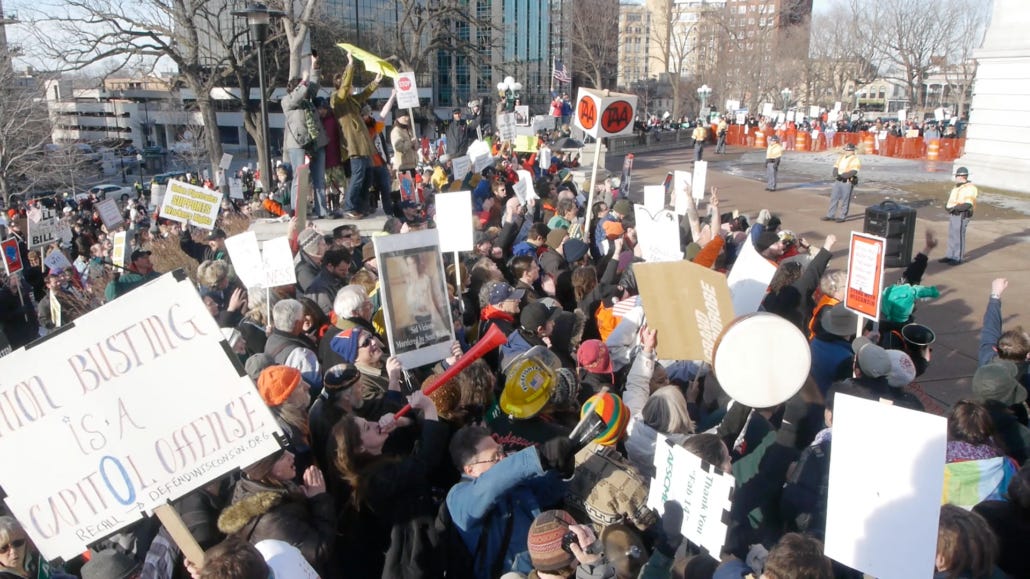Reviews of Divided We Fall
SAVAGE CINEMA: When We Fought & How We Lost
March 18, 2017
If you read only one review of Divided We Fall, please read Scott Collins over at Savage Cinema. It’s long – but well worth the time. Collins gets, in a profound way, what we were trying to do with our film.
"Divided We Fall," is a stunning, sobering documentary from Writer/Director Katherine M. Acosta, and proved itself to be a riveting, compulsively watchable experience. Yes, as previously stated, viewing the overall failures of this specific protest movement nearly brought me to tears but even so, I could easily tap back into those awesome emotions I felt from 2011 quite easily, as the passion and commitment of so many people truly felt as if it could move mountains.
Even while feeling discouraged, the importance of speaking truth to power, peacefully and by whatever means necessary, remains crucial to maintaining any sense of democracy. Acosta's film is extremely wise to this conceit but even wiser when it showcases the mistakes, the pitfalls, and the ways progressives and liberals can be apt to become lost in the weeds of their own making, as well as how agendas can clash even when working on the same ideological sides.
Wisconsin Film Festival: 'Divided We Fall' is a case study of the Act 10 protests
ROB THOMAS The Capital Times
Mar 14, 2017
Six years after the Act 10 protests roiled the Wisconsin Capitol, there have been several documentaries about the battle between Gov. Scott Walker and tens of thousands of protesters opposed to his plan to gut collective bargaining rights for most public employees.
“Citizen Koch” looked at the big corporate interests that backed Walker’s plan. “Wisconsin Rising” was a protester’s eye view of what it was like to be there in the Capitol.
But “Divided We Fall,” which screens at the 2017 Wisconsin Film Festival on April 2 at the Barrymore Theatre, is different. First-time filmmaker Katherine Acosta goes beyond the iconic images of the protests to ask organizers a simple question: What went wrong?
Jamala Rogers: “Divided We Fall Every Time”
February 16, 2017
This year’s UW Madison activist-in-resident, author of Ferguson is America, and Black Commentator columnist Jamala Rogers considers our film and the Wisconsin Uprising in historical perspective in her essay “Divided We Fall Every Time.”
The documentary is a deep dive into the resistance to Wisconsin Governor Scott Walker’s Act 10. Like most uprisings, it not the one thing that sparks the inferno, it’s a series of things that accumulate until The People can’t take it anymore. Act 10 was that thing that ignited the flame.
Act 10 was part of the Republican playbook to undermine unions and the Labor Movement. To address a nearly $4 billion deficit, the Republican Governor and his cronies in the state legislature decided to target bargaining rights, wages and benefits of public sector employees. Governor Walker unapologetically stated his strategy would be divide-and-conquer, to kick up the tensions between rural and urban citizens. The narrative became the “greedy” public sector workers in the cities were the reason Wisconsin’s small towns were suffering.
Louis Proyect’s Review of Divided We Fall
January 30, 2017
Fortunately for us, a new Barbara Kopple has emerged, namely Katherine M. Acosta, the sociologist and obviously politically advanced director of “Divided We Fall”, a film about the Wisconsin labor struggle that I had the good fortune to watch yesterday. For now, the film has not found a distributor and hopefully this review will inspire some enterprising party to invest in this film that is equal to Kopple at her best and moreover a story that demands the attention of everybody trying to understand how we have ended up with an orange-haired baboon in the White House determined to throw us back to the 1880s. Essentially, the defeat of the public workers struggle in Wisconsin involved all of the players and all of the contradictions that led to the defeat of Hillary Clinton and the nightmare we are now living with.
Even if you’ve read every article about the Wisconsin struggle as it was unfolding in 2011, nothing comes close to seeing exactly how young people and workers rallied to the capitol building to put their bodies on the line to oppose Scott Walker’s anti-labor assault that was as calculated a bid to destroy organized labor that year as Reagan’s firing of the airline controllers was in 1985.
Divided We Fall: Memories of the Wisconsin Uprising in 2011
Paul Buhle/ Portside January 24, 2017
“America is about to be Wisconsinized…”
Historian and author Paul Buhle (It Started in Wisconsin) links the 2011 Wisconsin Uprising and subsequent forcible implementation of Governor Scott Walker’s radical Republican agenda to our current national nightmare in his review of Divided We Fall at Portside.org. America, Buhle says, is about to be “Wisconsinized.”
The story behind the story—the struggle of class forces--has been told in some detail in several books, but a new film, Divided We Fall, directed by Katherine Acosta and now showing up at assorted film festivals, supplies the crucial elements of drama that few of us in the marching crowds understood at the time. It is also a wonderful re-enactment of the whole scene, bringing to life the drama and months’ long glory of a fightback that mirrored and mirrors so many anti-austerity struggles across the world. For anyone interested in how this played out in a Midwest American town, here is a film at least as important as recuperation or analysis of Occupy Wall Street, and likely to be more intimate, taking place as it does in a city of only 200,000 or so.
Selling out
"Divided We Fall" documents the capitulation of unions in the Wisconsin Uprising
by Esty Dinur/ The Isthmus October 13, 2016
As its title suggests, Divided We Fall is not another nostalgia film about the Wisconsin Uprising. Like other movies about the popular response to Gov. Scott Walker’s Act 10, it has footage of Wisconsinites marching, drumming and sleeping in the Capitol. But it doesn’t stop there. This documentary by first-time director Katherine Acosta, who has a sociology Ph.D. from the University of Nebraska-Lincoln, looks deeply into the mechanisms of the uprising and why it fizzled and, ultimately, failed. Weaving citizens’ videos with numerous interviews, the film offers new information, revealing what happened behind the scenes.

